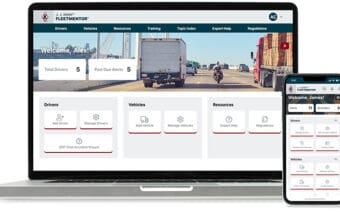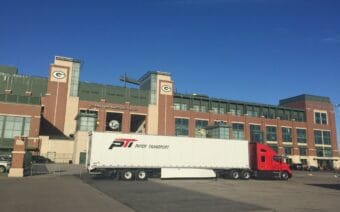
February 21, 2024
WISCONSIN — Though the paper industry and the transportation industry have changed dramatically in the past 90 years, the Wisconsin Paper Group has remained a constant – providing manufacturers with a cost-effective way to ship their products.
Founded in 1934 by 13 paper mill executives, the Wisconsin Paper Group (WPG) is the nation’s only not-for-profit shipping cooperative.
WPG, which is also known by the name WPG Shippers Association, serves as an extension of a business’ logistics team, with members sending orders for less-than-truckload capacity and shared truckload shipments for consolidation into multi-stop or single-stop truckload deliveries.
WPG President Tim Metten said companies save money using the cooperative.
“We can guarantee faster and more frequent deliveries of products at a lower cost,” he said. “This cost-savings mindset benefits all members by keeping freight rates lower than individual companies can achieve on their own.”
For example, Metten said, if a company has less than a full trailer of products to ship, the items can be combined on the same trailer with products from another organization.
“You only pay for the space you use,” he said.

WPG serves as an extension of a business’ logistics team, with members sending orders for less-than-truckload capacity and shared truckload shipments for consolidation into multi-stop or single-stop truckload deliveries. Submitted Photo
Niki O’Brien, manager of logistics at Milltown Paper, Inc. in Neenah, said working with WPG saves members time and money, as well as helps avoid many of the headaches of a common LTL (less-than-truckload) carrier.
“Whether the freight is consolidated at their facility or they give our freight to the common LTL carrier, our process is the same,” she said.
Adapting to meet customers’ needs
Headquartered in Neenah, Metten said WPG has evolved along with the region’s paper industry, moving from shipping paper to converted paper products, such as packaging, medical products, labels and more.
In 2000, he said WPG expanded even further, handling fabricated metal, primary metal, lumber, wood, furniture, fixtures, nonperishable food and kindred products, machinery and transportation equipment.
Today, Metten said WPG represents more than 100 Wisconsin and Upper Michigan companies.
To move members’ freight, he said WPG utilizes line-haul carriers and regional distributors throughout the United States, Canada, Mexico and Puerto Rico.
In addition to ground transportation, Metten said WPG also provides air freight services and warehousing services.
“Companies pay for their spot on the trailer,” he said. “We’re not here to make money. We’re here to keep the costs down for our members. We can be more flexible because we own the process. We offer a variety of services and do the legwork to find a solution.”
Mike Dailey, Billerud’s supply chain and distribution director, said that’s something the Swedish-based paper and packaging manufacturer appreciates.
Dailey said Billerud utilizes WPG for LTL shipments originating in Wisconsin and the Upper Peninsula.
“In the 22 years I have worked with them, I can think of countless times the WPG team went out of their way to provide unique service solutions to allow Billerud to meet our delivery needs,” he said.
Metten said WPG also specializes in non-traditional and overweight freight.
He said while other companies will transport those items, they charge extra.
“(At WPG), they pay for their place on the truck,” he said.
Metten said WPG has also evolved with industry and technology changes.
“While much has changed in manufacturing, transportation and logistics, the primary goal of our organization remains the same — even after 90 years,” he said. “By using a cooperative approach, members send as much volume as possible through our consolidation network to build more efficient loads, drive down costs and reduce touch points.”

The Wisconsin Paper Group was formed in 1934 when a group of paper mill executives met to discuss the mutual benefits of a shipper’s association to reduce transportation costs and improve service. Submitted Photo
WPG, Metten said, pools its members’ freight in Neenah and fills the trailers as appropriate.The co-op, he said, contracts with another company for its drivers and another company for its warehouse workers.
“The trailers are WPG’s, but the drivers are contracted specifically for the co-op so it’s the same drivers every day,” he said. “The same goes for those loading our trucks,” he said. “Another advantage for our members is their products are touched less, which means there are fewer opportunities for something to be lost or damaged.”
Technology, Metten said, plays a pivotal role at WPG — employees can closely monitor the freight and know where it is at all times.
He said members are also able to find out where their products are in real time.
WPG has 14 employees, Metten said, who have a combined 225 years of industry experience.
“We are good at what we do and aren’t afraid to say it,” he said.
Metten said one of his goals as WPG’s president is to grow the cooperative’s membership.
WPG covers an area roughly from central Wisconsin to Madison and to the east and then northward to include the Upper Peninsula.
“Our members are great advocates for us, telling people about us and what we do,” he said. “Every shipment is important to us, and we treat it as our own. Our passion is transportation.”
To learn more about WPG, visit wpg.org or contact Metten at tmetten@wpg.org.
 4imprint completes 170,000-square-foot expansion
4imprint completes 170,000-square-foot expansion Bluff View Bank: A bank with a 142-year view
Bluff View Bank: A bank with a 142-year view








